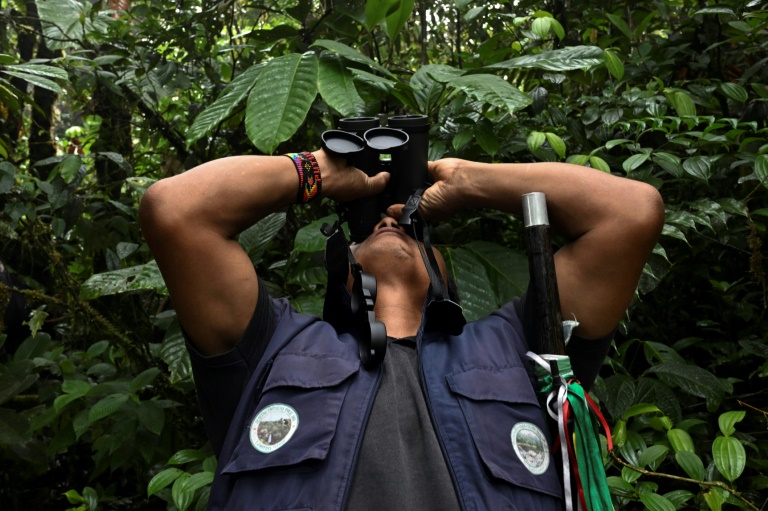The Awa people of Colombia have faced ongoing threats from various armed groups in the southwestern rainforests of the country for decades, yet remain deeply committed to protecting their environment and culture. As leaders gather for a significant biodiversity meeting in South America, the struggles of the Awa serve as a poignant representation of the fight for survival among Indigenous communities against external forces. According to Olivio Bisbicus, a prominent leader of the Awa, their resistance spans over 500 years, confronting issues such as invasion, discrimination, forced recruitment into armed groups, displacement, and acculturation. Bisbicus highlights the additional threat posed by drug trafficking, which disrupts territorial harmony and erodes cultural and natural wealth.
The Awa, referred to as “Inkal Awa,” meaning “People of the jungle,” inhabit the mountainous rainforests of Colombia and Ecuador. This strategic border area is under siege from three armed groups vying for control, primarily due to its significance as a drug trafficking corridor to the Pacific, alongside illegal gold mining activities. The regional conflict has led to a dire situation for the Awa, with officials indicating a critical risk to their safety and existence. The Colombian justice system has consistently documented violence against the Awa, with historical accounts highlighting the killing of 185 Awa between 1990 and 2016 in the context of conflicts with the FARC guerrilla army. This violence tragically continued even after a peace agreement in 2016, further underscoring the precarious position of Indigenous communities amidst entrenched political and economic instability.
The ongoing violence faced by the Awa has prompted warnings from organizations like the Norwegian Refugee Council, which reports an alarming trend of Indigenous communities, such as the Awa, being “at risk of extinction,” driven by the violent competition for land and resources. Despite these grave challenges, the Awa community has shown resilience; efforts to reclaim and protect their territory remain steadfast. In early 2023, a joint alert by Colombian and Ecuadorian human rights officials highlighted the deteriorating condition of the Awa people, with repeated calls from Colombia’s Constitutional Court urging for their protection. Nevertheless, violence erupted again, claiming the lives of three Awa men just months later, demonstrating the persistent threats they face.
Bisbicus articulates a philosophy that their struggle is emblematic of a broader battle for human rights and environmental stewardship. During a time when they are frequently outmatched, the Awa assert their commitment to non-violence and dialogue. The Unipa Indigenous guard, composed of 2,000 volunteers, relies on ancestral knowledge and cultural identity as powerful tools in protecting their lands. Bisbicus emphasizes that their territory is not a battlefield but rather a vital living space that deserves respect. The courage demonstrated by the Awa amid such adversity has caught the attention of international observers, including Gilles Bertrand, the European Union ambassador to Colombia, acknowledging their leadership in preserving both cultural and ecological integrity.
The spiritual connection the Awa share with their land is an integral aspect of their identity, providing a deep sense of belonging and responsibility towards their environment. This bond underscores their understanding of the territory not merely as a physical space, but as an essential aspect of their cultural and spiritual existence. For the Awa, nature is not just a resource but a nurturing force, described as “mother.” Cultural practices associated with land preservation encompass a holistic relationship with nature, where every element of the ecosystem is understood to contribute to their overall well-being and sustainability. This philosophy resonates strongly with efforts to protect the Awa land and biodiversity, which in turn reflects an essential part of their identity.
One illustrative example of this commitment is the Nutria private nature reserve, where the Awa actively engage in conservation efforts to sustain biodiversity. The reserve spans 365 hectares and hosts an array of flora and fauna, exemplifying their ambition for peace and ecotourism as a means of asserting their rights and maintaining their cultural identity. Guides working in the reserve echo this message, emphasizing the importance of nurturing the land to benefit both current and future generations. The positive impact on local ecosystems and possible paths forward for sustainable economic development shine a light on the intricate relationship between cultural preservation and environmental protection.
In conclusion, the Awa of Colombia represent a microcosm of the broader struggles Indigenous communities face globally, as they grapple with violence, cultural erosion, and environmental threats. Their deep spiritual connection to the land exemplifies an approach to conservation that prioritizes cultural integrity and emphasizes the importance of living in harmony with nature. Despite overwhelming challenges, the Awa’s resilience in protecting their territory and rich cultural heritage offers a vital perspective on the fight for Indigenous rights and environmental sustainability. Addressing their plight and ensuring their survival requires recognition of their inherent rights, support for their initiatives, and a concerted effort to quell the violence that continues to threaten their existence.

